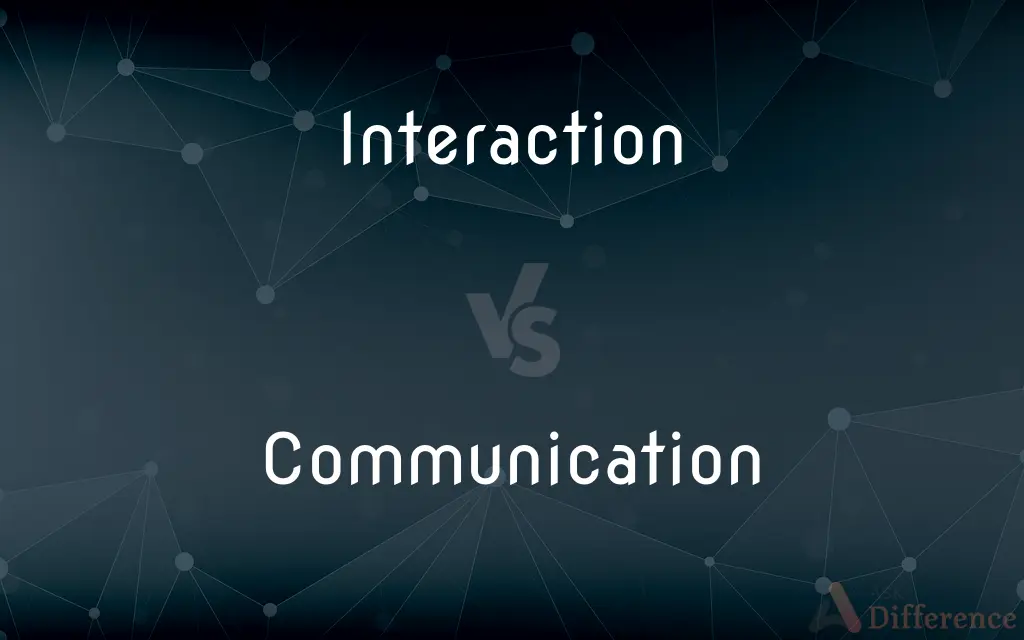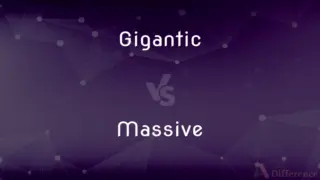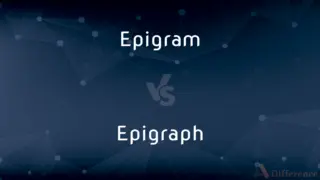Interaction vs. Communication — What's the Difference?
By Tayyaba Rehman — Updated on October 31, 2023
Interaction involves mutual actions or influence between entities, while Communication is the process of conveying information between individuals or groups.

Difference Between Interaction and Communication
Table of Contents
ADVERTISEMENT
Key Differences
Interaction and Communication are concepts integral to understanding human relationships and behaviors. Interaction signifies the mutual actions or influence between entities, whether they are people, systems, or objects. On the other hand, Communication specifically refers to the conveyance of information, feelings, or ideas between individuals or groups, often through established channels or mediums.
Both Interaction and Communication are foundational in social dynamics, but they serve different roles. While Communication is often a component of interaction, not all interactions necessarily involve communication. For example, two planets may interact through gravitational pull, but they don't communicate. Conversely, every instance of Communication is an interaction since it involves parties influencing each other with information.
The mediums and methods can vary for both Interaction and Communication. While Interaction can be non-verbal and doesn't always require a shared medium, Communication often requires a mutual language, sign, or system to convey the intended message effectively. For instance, body language is a form of non-verbal interaction, but it can also serve as a tool for communication.
Interaction can be passive, where entities may influence each other without an explicit intent. In contrast, Communication is typically an active process, where the sender aims to convey a particular message to a receiver. The complexity of the message, the clarity of the medium, and the receptivity of the receiver all determine the effectiveness of communication.
Comparison Chart
Definition
Mutual actions or influence
Conveyance of information
ADVERTISEMENT
Requirement
May or may not require intent
Requires intent to convey a message
Medium
Can be passive or non-verbal
Often requires a shared system or language
Examples
Gravitational pull, body language
Speech, writing, sign language
Type
Can be both active or passive
Typically an active process
Compare with Definitions
Interaction
Influence exerted between parties.
The drug has an interaction with certain foods.
Communication
A process involving senders and receivers.
Breakdowns in communication can lead to misunderstandings.
Interaction
Mutual actions between entities.
The interaction between students promotes collaborative learning.
Communication
Mutual understanding achieved through exchange.
Their open communication strengthened their relationship.
Interaction
A responsive engagement between systems.
The software interaction enhances user experience.
Communication
Communication (from Latin communicare, meaning "to share"or "to be in relation with") is "an apparent answer to the painful divisions between self and other, private and public, and inner thought and outer word." As this definition indicates, communication is difficult to define in a consistent manner, because it is commonly used to refer to a wide range of different behaviors (broadly: "the transfer of information"), or to limit what can be included in the category of communication (for example, requiring a "conscious intent" to persuade). John Peters argues the difficulty of defining communication emerges from the fact that communication is both a universal phenomena (because everyone communicates), and a specific discipline of institutional academic study.One possible definition of communication is the act of developing meaning among entities or groups through the use of sufficiently mutually understood signs, symbols, and semiotic conventions.
Interaction
Non-verbal or passive connection.
Their silent interaction spoke volumes.
Communication
The act of communicating; transmission.
Interaction
Interaction is a kind of action that occurs as two or more objects have an effect upon one another. The idea of a two-way effect is essential in the concept of interaction, as opposed to a one-way causal effect.
Communication
The exchange of thoughts, messages, or information, as by speech, signals, writing, or behavior.
Interaction
The act or process of interacting.
Communication
Interpersonal rapport.
Interaction
The state of undergoing interaction.
Communication
The art and technique of using words effectively to impart information or ideas.
Interaction
(Physics) See fundamental interaction.
Communication
The field of study concerned with the transmission of information by various means, such as print or broadcasting.
Interaction
The situation or occurrence in which two or more objects or events act upon one another to produce a new effect; the effect resulting from such a situation or occurrence.
Be aware of interactions between different medications.
Communication
Any of various professions involved with the transmission of information, such as advertising, broadcasting, or journalism.
Interaction
A conversation or exchange between people.
I enjoyed the interaction with a bunch of like-minded people.
Communication
Something communicated; a message.
Interaction
Intermediate action.
Communication
A system, such as mail, telephone, or television, for sending and receiving messages.
Interaction
Mutual or reciprocal action or influence; as, the interaction of the heart and lungs on each other.
Communication
A network of routes for sending messages and transporting troops and supplies.
Interaction
The effect, such as exertion of a force, that one object exerts on another, especially the capture or emission of a particle.
Communication
Communications The technology employed in transmitting messages.
Interaction
Communication between people, or the actions of people that affect others.
Communication
(Biology) The transfer of information from one molecule, cell, or organism to another, as by chemical or electrical signals or by behaviors.
Interaction
A mutual or reciprocal action; interacting
Communication
An opening or connecting passage between two structures.
Interaction
(physics) the transfer of energy between elementary particles or between an elementary particle and a field or between fields; mediated by gauge bosons
Communication
A joining or connecting of solid fibrous structures, such as tendons and nerves.
Interaction
A dynamic exchange between forces.
The interaction of wind and sea shapes coastlines.
Communication
The act or fact of communicating anything; transmission.
Communication of smallpox
Communication of a secret
Communication
(uncountable) The concept or state of exchanging data or information between entities.
Some say that communication is a necessary prerequisite for sentience; others say that it is a result thereof.
The node had established communication with the network, but had as yet sent no data.
Communication
A message; the essential data transferred in an act of communication.
Surveillance was accomplished by means of intercepting the spies' communications.
Communication
The body of all data transferred to one or both parties during an act of communication.
The subpoena required that the company document their communication with the plaintiff.
Communication
An instance of information transfer; a conversation or discourse.
The professors' communications consisted of lively discussions via email.
Communication
A passageway or opening between two locations; connection.
A round archway at the far end of the hallway provided communication to the main chamber.
Communication
(anatomy) A connection between two tissues, organs, or cavities.
Communication
(obsolete) Association; company.
Communication
Participation in Holy Communion.
Communication
(rhetoric) A trope by which a speaker assumes that his hearer is a partner in his sentiments, and says "we" instead of "I" or "you".
Communication
The act or fact of communicating; as, communication of smallpox; communication of a secret.
Communication
Intercourse by words, letters, or messages; interchange of thoughts or opinions, by conference or other means; conference; correspondence.
Argument . . . and friendly communication.
Communication
Association; company.
Evil communications corrupt good manners.
Communication
Means of communicating; means of passing from place to place; a connecting passage; connection.
The Euxine Sea is conveniently situated for trade, by the communication it has both with Asia and Europe.
Communication
That which is communicated or imparted; intelligence; news; a verbal or written message.
Communication
Participation in the Lord's supper.
Communication
A trope, by which a speaker assumes that his hearer is a partner in his sentiments, and says we, instead of I or you.
Communication
The activity of communicating; the activity of conveying information;
They could not act without official communication from Moscow
Communication
Something that is communicated by or to or between people or groups
Communication
A connection allowing access between persons or places;
How many lines of communication can there be among four people?
A secret passageway provided communication between the two rooms
Communication
Conveyance of information between parties.
Effective communication is key in any team.
Communication
Transmission of feelings or ideas.
Through art, she found a medium for communication.
Communication
Use of language, signs, or systems to convey meaning.
With the advent of technology, digital communication has surged.
Common Curiosities
Can Interaction occur without intent?
Yes, Interactions can be passive and happen without explicit intent, unlike Communication which requires intent.
How does medium affect Communication?
The chosen medium can influence the clarity, speed, and effectiveness of Communication.
Is every Interaction a form of Communication?
No, while every Communication is an Interaction, not all Interactions are forms of Communication.
Can two objects have an Interaction without Communication?
Yes, two objects can interact, like through gravitational pull, without communicating.
Do digital platforms change the way we interact and communicate?
Yes, digital platforms introduce new modes of Interaction and Communication, often making them more immediate and global.
Can misunderstandings arise from both Interaction and Communication?
Yes, misunderstandings can result from misinterpreted Interactions or miscommunications.
What's the primary goal of Communication?
The primary goal of Communication is to convey information, feelings, or ideas between parties.
Can body language be considered both Interaction and Communication?
Yes, body language is a form of non-verbal Interaction and can also convey messages, making it a form of Communication.
Which is broader in scope, Interaction or Communication?
Interaction is broader, encompassing any form of mutual influence, while Communication is a specific type of Interaction.
Do animals engage in Interaction and Communication?
Yes, animals engage in both Interaction (like territorial displays) and Communication (like bird calls).
Why is mutual understanding crucial in Communication?
Mutual understanding ensures that the message is correctly received and interpreted as intended by the sender.
Are all forms of Communication verbal?
No, Communication can be verbal, non-verbal, written, or through signs and symbols.
Can Interaction lead to better Communication?
Yes, frequent Interaction can foster understanding and improve Communication between parties.
Is feedback essential in both Interaction and Communication?
Feedback can enhance both Interaction and Communication by providing clarity and mutual understanding.
How have modern technologies impacted Interaction and Communication?
Modern technologies have facilitated faster, broader, and sometimes more impersonal forms of Interaction and Communication.
Share Your Discovery

Previous Comparison
Gigantic vs. Massive
Next Comparison
Epigram vs. EpigraphAuthor Spotlight
Written by
Tayyaba RehmanTayyaba Rehman is a distinguished writer, currently serving as a primary contributor to askdifference.com. As a researcher in semantics and etymology, Tayyaba's passion for the complexity of languages and their distinctions has found a perfect home on the platform. Tayyaba delves into the intricacies of language, distinguishing between commonly confused words and phrases, thereby providing clarity for readers worldwide.
















































